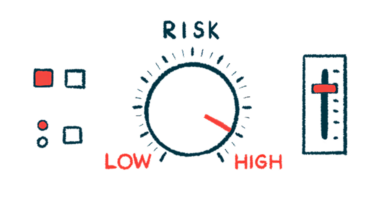More active disease linked to higher myasthenia gravis exacerbation risk
Researchers suggest early escalation of MG therapies to prevent crises

People with myasthenia gravis (MG) who have more active disease are at a higher risk of having an exacerbation, or a sudden worsening of symptoms, a new study from Germany has found.
Even after appropriate treatment for an exacerbation, this group of MG patients remained clinically more impaired, the data showed.
According to the researchers, this suggests that poor disease control due to highly active myasthenia gravis before an exacerbation “might thus explain the susceptibility of patients towards [a crisis] in [the] absence of further trigger factors.”
Thus, “early escalation of MG therapies in order to prevent [exacerbation] might be beneficial for some patients,” the team wrote.
The study, “Myasthenic crises are associated with negative long-term outcomes in myasthenia gravis,” was published in the Journal of Neurology.
Evaluating myasthenia gravis patient outcomes with/without an exacerbation
In MG, self-reactive antibodies attack and damage components of the neuromuscular junction — the region where nerve cells communicate with the muscles they control. This leads to weakness and fatigue in various muscles, which can be limited to the eyes and eyelids in the case of ocular MG, or more widespread and not restricted to a particular muscle group as in generalized MG.
People with MG can experience acute myasthenic exacerbation marked by progressive muscle weakness, double vision, and difficulties swallowing and breathing. Such worsening can further deteriorate into a life-threatening myasthenic crisis requiring hospitalization and mechanical breathing support.
Still, the impact of these events on the long-term course of MG remains poorly understood.
To address this gap, a team led by scientists at Justus Liebig University, in Germany, evaluated the outcomes of MG patients with and without exacerbation/crisis.
Data were examined from 80 MG patients, who had a mean age of 57. Among them were 51 women and 29 men. Of them, 12 patients experienced an exacerbation, and two had a myasthenic crisis. No obvious triggers for exacerbations, such as infections or a change in medications, were identified.
There were no significant differences in age, sex, the types of self-reactive antibodies, or disease duration among patients who experienced myasthenic exacerbations versus those who did not.
However, more patients who experienced an exacerbation had more active disease before having a complication, as determined by the MG Foundation of America (MGFA) scale, than did those who did not experience such worsening (73% vs. 27%). Similar results were found regarding disease severity, evaluated using the Quantitative MG (QMG) scale.
Our results indicate that the prevention of [exacerbations] might be crucial for the long-term clinical status of patients with MG. … Our data argue for an early escalation of therapy in patients with a high burden of disease and indication of a highly active MG.
In line with these findings, patients who had MG exacerbations were treated significantly more often with immunotherapies. Further, more of these patients received steroids, and at a higher mean dose.
Rescue treatment for exacerbation included plasma exchange (PLEX) in four patients and intravenous immunoglobulin (IVIg) infusions in five. Five of these patients underwent repeat PLEX and IVIg due to insufficient response, and five were admitted to the intensive care unit due to exacerbations.
During follow-up, those with exacerbations required an escalation of immunotherapy because of disease progression, whereas those without exacerbation remained stable throughout.
Moreover, exacerbations occurred significantly more frequently in those with other autoimmune diseases — and were associated with more frequent hospitalizations.
Although QMG scores rapidly declined to pre-exacerbation levels following acute treatment, they remained higher than they did in patients without exacerbations.
“Our results indicate that the prevention of [exacerbations] might be crucial for the long-term clinical status of patients with MG,” the team wrote. “Our data argue for an early escalation of therapy in patients with a high burden of disease and indication of a highly active MG.”








Leave a comment
Fill in the required fields to post. Your email address will not be published.